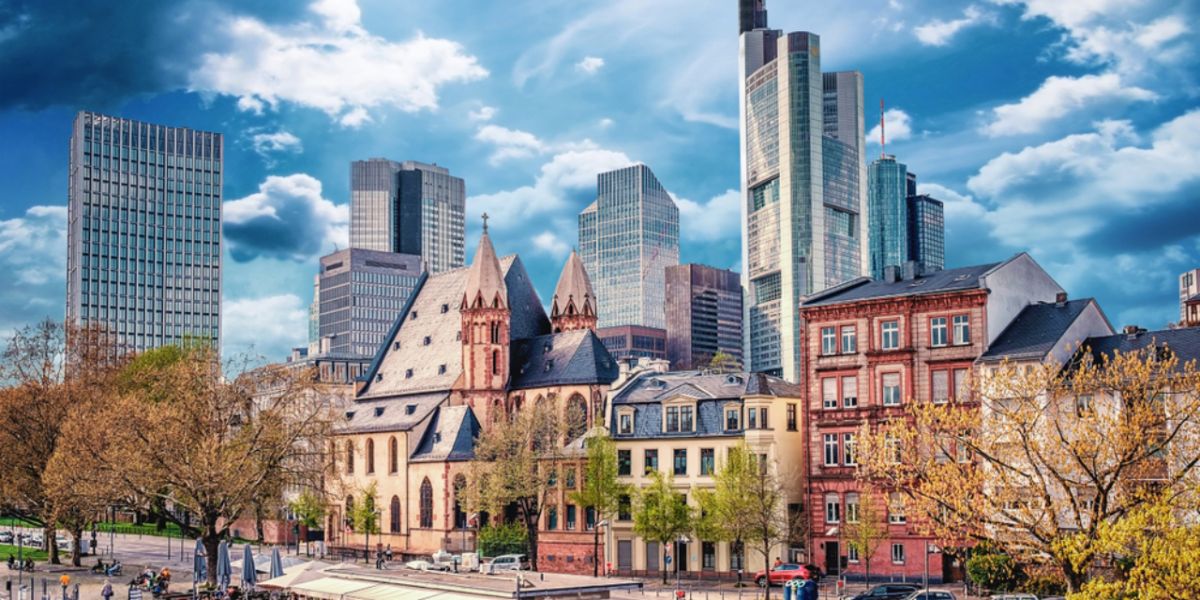
Accommodation in Frankfurt is relatively affordable, and depending on your needs and lifestyle, you can opt for a house with a garden in the residential areas of Frankfurt or an apartment in the city center. Frankfurt is a very green city, making you feel as if you are living in the countryside while having all the amenities, entertainment, and infrastructure that a big city offers.
The Frankfurt Green Belt (Frankfurter Grüngürtel), a protected forested area of about 8,000 hectares, surrounds the city and functions as its lung. Regardless of where you live, weekends are for farmers' market visits, and spring in Frankfurt is for festivals. In other words, living in Frankfurt means having a lot of fun!
Setting up an expat life in Frankfurt
Whether you are an active person who loves to explore the outdoors, someone who values good food and new flavors, or an artistic personality who gets lost for hours in museums and art galleries, Frankfurt is the right expat destination for you. Besides, Frankfurt is also Germany's financial center, meaning that expatriates can achieve a desirable work-life balance and share their time between their professional demands and Frankfurt's beautiful parks and charming cafés. Also, studying in Frankfurt can boost your career and allow you to quickly set foot in the German labor market, as Frankfurt has reputable higher education institutions such as Johann Wolfgang Goethe University, which is among the best in the world for law and finance.
The city has a reputation for being the most expensive in Germany, after Munich. Hence, the competition for rentals is fierce. This is mainly due to the large influx of newcomers and companies who set up their headquarters in the city or its surrounding areas. This is also why being decisive, fast, and well-informed is the best formula for finding a good place to call home! At the same time, the standard of living in Frankfurt is very high, consisting of citizens' good health and access to excellent healthcare services, as well as opportunities for societal and economic progress in spite of the challenges imposed by the COVID-19 crisis.
Types of accommodation in Frankfurt
Frankfurt offers any type of accommodation in abundance, from modern apartments (Neuehaus) and apartments in historical buildings (Altbau), which are mostly found in the city center, to family houses in the suburbs and shared accommodation options, especially for students and young professionals. It's worth noting that shared housing and studio flats are in high demand, meaning that options are limited, and one should start looking well in advance to secure a decent place. There are furnished and unfurnished places in the market; however, note that unfurnished usually means without kitchen appliances (e.g., fridge, washing machine, stove, and dishwasher). At the end of the day, the type of accommodation you will opt for depends on your and your family's needs if you arrive in Frankfurt with your partner and children.
Good to know:
Studio apartments are the most sought-after type of accommodation in Frankfurt.
Neighborhoods in Frankfurt
Whether you are looking for a quiet neighborhood where your children can play freely outside or a commuter's spot to meet your frequent traveler's needs, Frankfurt has a neighborhood for every type of resident — from the workaholic who wants to be at the heart of business happenings to the laid back personality that enjoys long walks in nature. Frankfurt has an unusual cityscape for Europe, as its skyscrapers along the banks of the Main River remind us more of Manhattan. Hence, Germans often refer to Frankfurt as Mainhatten. This area, which has tall and modern buildings, is Frankfurt's financial district, housing the European Central Bank and the stock exchange.
Bahnhofsviertel (north of Main) and Sachsenhausen (south of Main) are great areas to live in if you are keen to enjoy Frankfurt's nightlife and want to have easy access to the rest of the city and country, as both areas are well-served by all modes of local, regional, and national transport. In fact, Bahnhofsviertel means Central Train Station District. In addition, the Frankfurt International Airport is only 13 kilometers away from the west. Innenstadt is a shopping district, and maybe it doesn't offer many accommodation options. However, it is the best spot to go shopping. Gutleutviertel used to be a working-class district close to the banks of the river. Today, industrial buildings are being replaced by modern residential and commercial estates, making Gutleutviertel a very attractive area among young professionals and young families. Besides, here, you will find shopping centers, restaurants, and small leisure parks.
Good to know:
Wherever you settle in Frankfurt, the city is served by an efficient and well-organized transport system, including the metro lines (U-Bahn) and regional trains (S-Bahn).
Renting accommodation in Frankfurt
Understanding the rent prices is one of the main steps in deciding on housing type and location when planning to rent housing in Frankfurt. Rent is, without a doubt, the most significant part of expenses when living in Frankfurt, and given the large demand, rent prices are usually on the rise. Prices for studio flats start from 1,000 euros, while two-bedroom apartments cost between 1,800 and 2,200 euros in decent areas. Areas such as Sachsenhausen, Westend, and Nordend are some of the most beautiful for living in but are also more expensive and may be of interest to families or individuals who work in the nearby areas. Bornheim is a lively area that usually offers more affordable rent options, which is perfect for students or solo expats. Also, Gallus and Europaviertel offer affordable and modern apartments but lack the beauty of the more central places. Ostend is known as a quiet neighborhood, offering lower rents and opportunities for fun and entertainment.
Good to know:
The closer you want to live in Innenstadt (the inner city), the higher the rent will be.
Finding and booking accommodation in Frankfurt
Now that you have a better idea of where you want to live and what type of accommodation you are looking for, it's time to start your house hunting. We highly recommend you start a conversation in Expat.com's friendly and active Frankfurt forum, where seasoned expats in the region can guide you and give you insights by sharing their experiences and tips. Also, you can begin your search directly on Expat.com's Housing in Frankfurt page. One important thing to keep in mind during your research is that some houses' rent includes all utility bills (Warmmiete), whereas other house owners ask you to pay your bills on top of the rent price (Kaltmiete).
When viewing a place, you should have the necessary documents with you, such as your German residence permit, employment contract, or most recent payslip, and possibly a recommendation letter from the owner of your previous rental. Some house owners may even ask for SCHUFA Auskunft, which is your credit score, but this is not available for newcomers in Germany. Viewing apartments in Germany is almost like interviewing for a job, as due to the high demand, house owners are in a privileged position and have the luxury of picking and choosing among many possible tenants. Thus, it is crucial to make a good first impression and create rapport with the person who is showing you the place.
To book the place, you should usually pay two months' deposit, which you will get back at the end of your tenancy if there are no damages made by you, and the rent for the first month. Once you find your home in Frankfurt, you should purchase home insurance from a private insurance provider or the bank, but check with the house owner for more details. After successfully finding a place in Frankfurt, it is important to understand the rules of the condominium and organize all the documents related to the new address. If you wish to terminate your contract before its official end date, you have to do so in writing at least three months before your planned day of evacuation. Otherwise, you will lose your deposit. If you need to leave earlier than 3 months, it's worth talking to your landlord. Because of the high demand for properties, they're likely to allow you to leave earlier.
Attention:
Due to the high demand, scammers are not scarce in Germany. Never pay money in advance if you have not seen the place, met the house owner or a reliable contact in person, and have not signed a contract. Do not accept people offering to send you keys in the post, either.
Useful links:
We do our best to provide accurate and up to date information. However, if you have noticed any inaccuracies in this article, please let us know in the comments section below.








